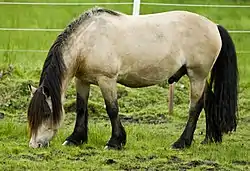ፈረስ
Amharic

ፈረስ(1)።

ፈረስ(2)።
Etymology
From Proto-West Semitic *paraš-. Cognates include Ge'ez ፈረስ (färäs) and Arabic فَرَس (faras).
Pronunciation
- IPA(key): /ˈfəɾəs/
- Hyphenation: ፈ‧ረስ
Usage notes
- The gender of ፈረስ depends on the natural gender of the referent. As such, it may be translated as either stallion (masculine) or mare (feminine) depending on the context. If the natural gender is unknown, the masculine gender is used.
Declension
Definiteness forms of ፈረስ (färäs)
| Masculine | Feminine | |
|---|---|---|
| Indefinite | ፈረስ (färäs) | |
| Definite subject | ፈረሱ (färäsu) | ፈረሷ (färäsʷa) ፈረሲቱ (färäsitu) ፈረሲቷ (färäsitʷa) |
| Definite object | ፈረሱን (färäsun) | ፈረሷን (färäsʷan) ፈረሲቱን (färäsitun) ፈረሲቷን (färäsitʷan) |
| General object | ፈረስን (färäsən) | |
Possessive forms of ፈረስ (färäs)
| Singular | Plural | Formal | ||
|---|---|---|---|---|
| First person | ፈረሴ (färäse) | ፈረሳችን (färäsaččən) | — | |
| Second person | m | ፈረስህ (färäsəh) | ፈረሳችሁ (färäsaččəhu) | ፈረስዎ (färäswo) |
| f | ፈረስሽ (färäsəš) | |||
| Third person | m | ፈረሱ (färäsu) | ፈረሳቸው (färäsaččäw) | |
| f | ፈረሷ (färäsʷa) | |||
References
- Thomas Leiper Kane (1990), “ፈረስ”, in Amharic-English Dictionary, Wiesbaden: Otto Harrassowitz, →ISBN
- Wolf Leslau (2000) Introductory Grammar of Amharic, Wiesbaden: Otto Harrassowitz, →ISBN, page 20
Ge'ez
Related terms
- ፈረሳዊ (färäsawi)
- አፍራሲ (ʾäfrasi)
References
- Dillmann, August (1865), “ፈረስ”, in Lexicon linguae aethiopicae cum indice latino (in Latin), Leipzig: T. O. Weigel
Tigrinya
This article is issued from Wiktionary. The text is licensed under Creative Commons - Attribution - Sharealike. Additional terms may apply for the media files.